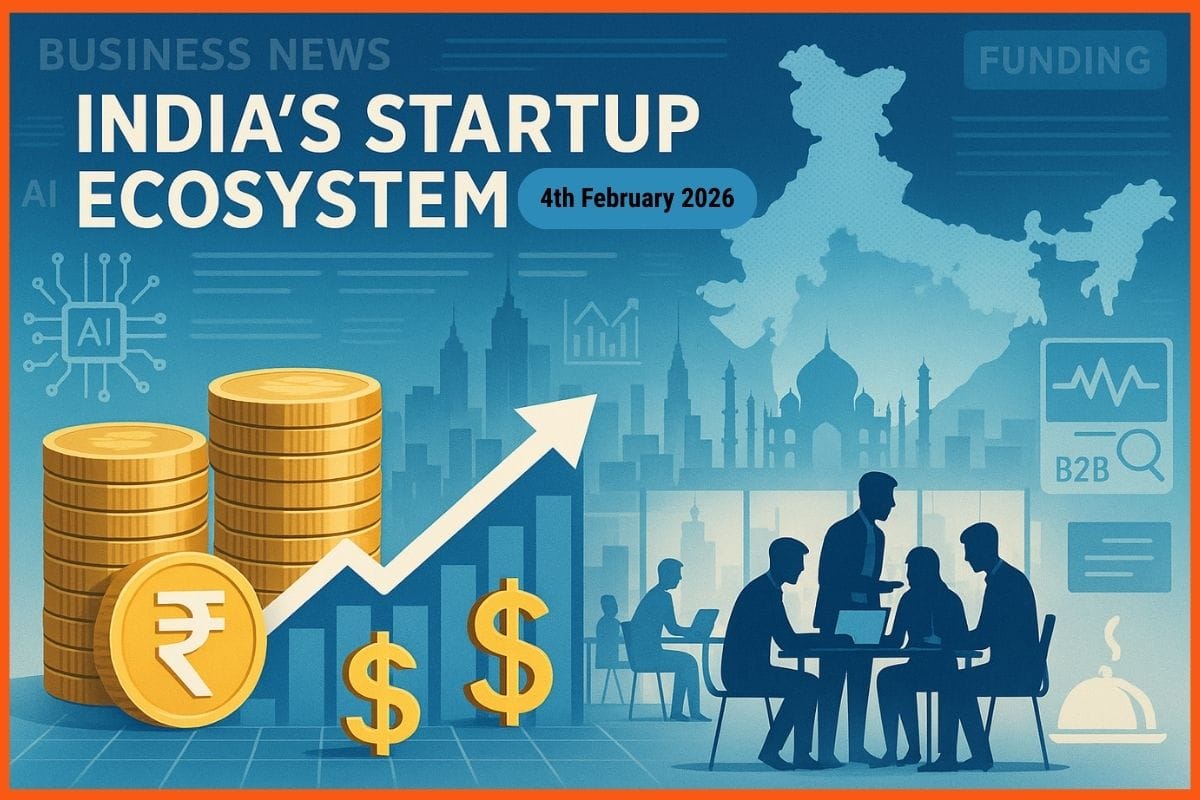Web3's Impact on Indian Economy; $1.1 Trillion Growth by 2032
🔍Insights
Web3 to add $1.1 trillion to India’s GDP by 2032. Over 450 Web3 startups in India raised $1.3 billion in funding by April 2023.
Web3 is the next generation of the internet, built on blockchain technology. It is a decentralized and open web that gives users more control over their data and privacy. Web3 is still in its early stages of development, but it has the potential to revolutionize many industries and sectors.
Web3 is impacting the Indian economy in several ways. One of the most significant impacts is on economic growth. A report by the US-India Strategic Partnership Forum found that Web3 could add $1.1 trillion to India's GDP by 2032. This growth would be driven by several factors, including the creation of new jobs, the expansion of existing businesses, and the development of new industries.
A report by NASSCOM found that over 450 Web3 startups in India had raised $1.3 billion in funding by April 2023. This funding is being used to develop new Web3 products and services and to hire new employees. The Web3 job market in India is expected to continue to grow in the years to come, as more and more businesses adopt Web3 technology.
Another way that Web3 is impacting the Indian economy is by promoting financial inclusion. Web3 could help to bring financial services to millions of Indians who are currently unbanked or underbanked. For example, decentralized finance (DeFi) applications can provide loans and other financial services to people without a bank account. It is also fostering innovation in a wide range of sectors, including finance, healthcare, and education. For example, Indian startups are developing Web3-based applications for everything from supply chain management to medical records. These applications have the potential to improve efficiency, transparency, and security in a variety of industries.
Key Impacts of Web3 on the Indian Economy
Opportunities and Challenges for Web3 to Grow in India
Role of Government and Private Sector in Supporting the Growth
Web3's Impact on Key Indian Industries
Key Impacts of Web3 on the Indian Economy
Mr. Alankar Saxena, CTO of Mudrex, said, “Web3 is starting to transform the Indian economy already. It enables secure digital identity solutions, reduces fraud, and improves supply chain transparency. NFTs and decentralized finance (DeFi) platforms are gaining traction, opening new investment opportunities. Overall, Web3 is poised to reshape various sectors, fostering innovation and economic growth.”
As per a recent report published by Chainalysis, India ranks first globally in Grassroots Crypto Adoption. In terms of the raw volume of transactions, the country has the second-greatest number in the world, beating out those of several other, wealthier nations. About 75,000 people in the country are engaged in the sector at present. This number constitutes 11% of the global talent.
Mr. Dilip Chenoy, Chairman of Bharat Web3 Association said, “The widespread adoption of Web3 in the country is visible across the spectrum of applications that have evolved out of the technology. For example, consider DeFi. The country has been the number one adopter of DeFi in terms of value received on the chain, with an estimated $88 billion received in 2020-21. The NFT market alone generated a revenue of $9 million in 2023 and is expected to grow significantly over the next few years.”
Further, he also mentioned that use cases of the technology have emerged across sectors over the years with public and private sector organizations implementing Web3 for solutions related to education, lending, real estate, service delivery, healthcare, and more.
The government of Maharashtra recently issued caste certificates to its 65,000 residents via LegitDoc — a polygon public blockchain-based platform. Further, the Delhi Forensic Science Laboratory (DFSL) and the Delhi Police have integrated blockchain technology into their e-forensic application, ensuring an immutable and transparent record of the chain of custody for evidence.

Opportunities and Challenges for Web3 to Grow in India
Mr. Trishneet Arora, Founder and CEO of TAC Security pointed out a few key opportunities and challenges existing in the Indian Web3 space.
Opportunities
- Decentralized Finance (DeFi) Adoption: India's financial landscape is poised for transformation with DeFi. The opportunity for decentralized lending, borrowing, and trading platforms to provide financial inclusion and accessibility to millions of unbanked or underbanked Indians is immense.
- Blockchain-based Supply Chains: India's supply chain challenges, particularly in agriculture, can benefit from blockchain's transparency and traceability. Blockchain-based solutions offer the opportunity to streamline supply chains, reduce fraud, and improve food safety.
- Digital Identity Solutions: India's push for digital identity solutions is an opportunity for Web3 to provide secure, self-sovereign identity solutions.
- NFT Market Growth: India's thriving art and entertainment industry can benefit from NFTs, allowing creators to monetize digital assets.
- Smart Contracts for Legal Tech: Smart contracts can revolutionize the legal industry by automating agreements and reducing the need for intermediaries.
- Data Privacy and Ownership: The growing concern for data privacy and ownership provides opportunities for Web3 solutions that empower individuals to control their data.
- DApps for Business: Decentralized applications (DApps) built on blockchain offer increased transparency and security. They can find applications in supply chain management, finance, and more.
Challenges
- Regulatory Uncertainty: The evolving regulatory landscape for cryptocurrencies and blockchain in India poses a challenge.
- Cybersecurity Threats: With the growth of Web3, cybersecurity threats become more complex. TAC Security faces the challenge of staying ahead of emerging threats and vulnerabilities to provide robust cybersecurity solutions.
- Lack of Awareness: Widespread adoption of Web3 technologies in India may be hindered by a lack of awareness and understanding. TAC Security can contribute to education and awareness efforts to address this challenge.
- Infrastructure and Connectivity: Web3 relies on a robust digital infrastructure and reliable internet connectivity. Addressing infrastructure gaps and improving connectivity in remote areas can be challenging but essential for Web3 growth.
- User Trust and Adoption: Building user trust in Web3 applications and encouraging adoption is crucial.
- Scalability: As Web3 platforms gain popularity, scalability becomes a challenge.
- Interoperability: The interoperability of different Web3 technologies and blockchains is vital for seamless integration.
Web3 presents a transformative potential for India, with opportunities spanning finance, supply chains, digital identity, and more. However, it also comes with regulatory, cybersecurity, and infrastructure challenges that TAC Security must address to facilitate its growth and secure its implementation effectively.
Mr. Kumar Gaurav, Founder and CEO of Cashaa said, “Until the uncertainty in regulations persists, the investment community cannot go full steam in backing this technological development in the country and large-scale mass adoption will also not be possible. Educating the user base about the potential and challenges of this technology is also lacking at the moment.”

Role of Government and Private Sector in Supporting the Growth
The Government has taken a keen interest in the development of Web3 in the country with the Ministry of Information and Technology (MeitY) working to develop the National Blockchain Framework and advance the National Blockchain Strategy. The Bharat Web3 Association (BWA) also conducted a workshop in collaboration with the Ministry of Information and Technology as part of a larger effort to demystify Web3 and bridge the gap between the government and the private sector.
Mr. Chenoy, of Bharat Web3 Association, said, “The government and private sector have also been collaborating on Capacity Building and Education in the Web3 space. Private as well as government universities are increasingly integrating dedicated Web3 curriculums and programs to familiarize students with the nuances of Web3 and develop a specific skill set for future growth within the sector.”
He further mentioned that the governments can also provide financial support to startups engaged in the Web3 space through funding programs, grants, tax breaks, and other incentives to incentivize the growth of the Web3 sector in India.
India has also seen major developments in terms of regulation over the past 2 years. The major developments include MeitY releasing the National Strategy on Blockchain, The Advertising Standards Council of India releasing guidelines for advertising VDAs, inclusion of VDAs under the purview of the Income Tax Act, 1961, The Indian Computer Emergency Response Team (CERT-In) issuing guidelines for Virtual Asset Service Providers (VASPs) under the IT Act 2001, National Cyber Crime reporting portal creating a channel for customers to report fraud in the industry, and Prevention of Money Laundering Act registering VASPs as ‘reporting entities'.
Additionally, state governments have also taken a proactive approach to the growth of the Web3 sector. This can be seen through the development of regulatory sandboxes, which provide a controlled environment for testing and experimentation with Web3 technologies in a compliant manner. The Telangana Regulatory Sandbox initiated by the Government of Telangana, allows startups, innovators, and corporates to test their solutions in a controlled environment over up to 6 months. Several state governments are now interested in the creation of a regulatory sandbox to promote the growth of Web3 startups in their states.
Mr. Arora, of TAC Security highlighted several key developments in India's Web3 landscape. Private sector entities, particularly startups, are actively driving Web3 solutions across sectors like finance, healthcare, and supply chain, bolstering Web3 technology's growth. Private investors and venture capital firms provide essential funding, expediting innovation. Companies are integrating Web3 tech into their operations, such as blockchain for supply chain management and DeFi in finance. Collaborations between private organizations and educational institutions are addressing the skills gap in the industry, while advocacy groups promote Web3 technologies. Additionally, private cybersecurity firms, including TAC Security, are enhancing security for Web3 platforms. Mr. Arora stressed the significance of public-private collaboration in India, with the government working on regulatory frameworks and digital infrastructure, while the private sector fuels Web3 innovation, investment, and adoption, ensuring its sustainable growth in the country.

Web3's Impact on Key Indian Industries
Nishant Sachdev, VP-Strategy, Compunnel, mentioned that India's extensive tech population has the potential to significantly contribute to Web3. He highlighted that Compunnel's AI-supported recruitment platforms are dedicated to matching the appropriate talent with the changing requirements within this domain.
He also pointed out the significance of the rising middle class and how it can impact business dynamics. Nishant Sachdev emphasized that their market research, powered by OpenAI, is focused on identifying the evolving investment trends within this demographic. This research aids businesses in customizing their offerings to align with the changing preferences and needs of the middle class.
Web3 technologies have the potential to impact a wide range of industries in India. While their influence can extend to many sectors, some specific industries are likely to be significantly impacted by Web3:
- Finance and Banking: Web3 technologies, especially blockchain and decentralized finance (DeFi), can revolutionize traditional banking and financial services. They offer opportunities for faster and more cost-effective transactions, financial inclusion, and secure digital assets management.
- Supply Chain Management: Blockchain-based supply chain solutions can enhance transparency, traceability, and efficiency in industries like agriculture, manufacturing, and logistics. This can lead to reduced fraud, improved product quality, and streamlined processes.
- Healthcare: Web3 technologies can secure and streamline electronic health records, ensuring data privacy and interoperability. Smart contracts can automate insurance claims, and telemedicine can benefit from decentralized applications (DApps).
- Government and Governance: Blockchain has the potential to enhance government services, such as land record management, voting systems, and identity verification. This can lead to reduced corruption, increased transparency, and efficient public service delivery.
- Art and Entertainment: Non-fungible tokens (NFTs) on Web3 platforms have opened up new avenues for artists, musicians, and content creators to monetize their digital assets. The entertainment industry can leverage blockchain for rights management.
- Education: Blockchain can be used to verify academic credentials and qualifications, reducing fraud, and simplifying the verification process for educational institutions and employers.
- Real Estate: Property transactions and land records can be made more secure and efficient with blockchain technology, reducing the risk of fraud and disputes.
- Agriculture: Web3 can help farmers by providing transparent and secure supply chain solutions. It can also facilitate access to financing and markets for agricultural products.
- Energy and Utilities: Blockchain can enable transparent energy trading and reduce fraud in utility billing. Decentralized energy grids can enhance energy distribution efficiency.
- Legal Services: Smart contracts on blockchain can automate legal agreements, making legal processes more efficient and cost-effective.
- Insurance: The insurance industry can benefit from smart contracts for claims processing and more accurate risk assessment.
- Retail and E-commerce: Web3 technologies can enhance customer trust through transparent supply chains and secure online transactions.
- Cybersecurity: With the adoption of Web3, the need for robust cybersecurity solutions to protect digital assets and user data becomes even more critical.
Mr. Chenoy mentioned that Apollo Hospitals is employing the Metaverse for various purposes, including patient consultations before and after surgeries. Additionally, they are utilizing it for staff training to facilitate patient counseling in a virtual reality setting. The objective is to enhance patient outcomes by offering a personalized approach to each patient, ultimately leading to increased patient satisfaction.
Furthermore, Flipkart has introduced the Flipverse, a marketplace designed to foster more immersive interactions between consumers and brands. It achieves this by granting access to brands, supercoins, and digital collectibles. The Flipverse is designed to provide gamified, interactive, and immersive shopping experiences.
In the automotive sector in India, several manufacturers have ventured into the world of the metaverse. At the recent Auto Expo 2023, MG Motor India unveiled the MGverse, a futuristic 3D metaverse platform. This platform allows users to virtually explore the MG Pavilion at the Auto Expo 2023 from any location, offering a virtual tour of the event.
Also, in West Bengal, the New Town Kolkata Development Authority (NKDA) has outlined plans to release 500,000 non-fungible tokens (NFTs) to enhance the land mutation process. Land mutation is a legal procedure involving the registration and transfer of land ownership.
While these industries stand to be significantly impacted, it's essential to note that Web3 technologies are highly versatile and can find applications in various sectors, contributing to innovation and transformation across the Indian economy.
Must have tools for startups - Recommended by StartupTalky
- Convert Visitors into Leads- SeizeLead
- Website Builder SquareSpace
- Run your business Smoothly Systeme.io
- Stock Images Shutterstock







